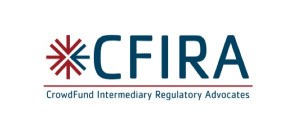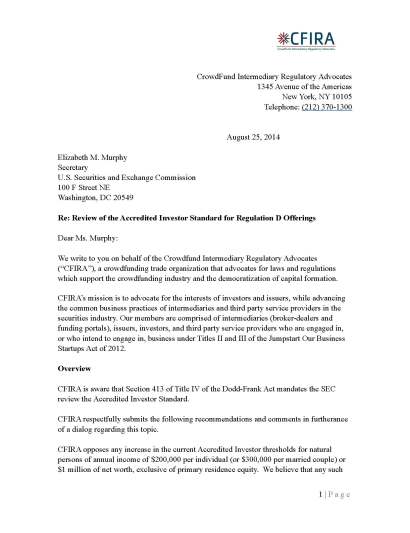 As I have talked about in a recent article (“Changes To “Accredited Investor” Definition May Clip The Wings Of Many Angel Investors“), the SEC is required by the Dodd-Frank Act to re-examine the definition of “accredited investor” under the Securities Act of 1933 this year and there is currently a big debate going on as to what changes, if any, the SEC should make. This week, the Crowdfund Intermediary Regulator Advocates (CFIRA) made their opinions on this issue known in a letter to Elizabeth M. Murphy, Secretary of the SEC.
As I have talked about in a recent article (“Changes To “Accredited Investor” Definition May Clip The Wings Of Many Angel Investors“), the SEC is required by the Dodd-Frank Act to re-examine the definition of “accredited investor” under the Securities Act of 1933 this year and there is currently a big debate going on as to what changes, if any, the SEC should make. This week, the Crowdfund Intermediary Regulator Advocates (CFIRA) made their opinions on this issue known in a letter to Elizabeth M. Murphy, Secretary of the SEC.
For those that don’t know, CFIRA is a trade organization composed of crowdfunding professionals (including myself) who advocate for laws, regulations and practices which support the crowdfunding industry. Given the potential adverse effects that changes to the definition of “accredited investor” would have on the private placement industry as a whole (as addressed in detail in my prior post), in a very concise and thorough letter,  CFIRA outlined its suggestions as to what changes should be made to the current definition.
CFIRA outlined its suggestions as to what changes should be made to the current definition.
First and foremost, CFIRA stated that it opposes any increase by the SEC in the current annual income threshold ($200,000 per individual or $300,000 per married couple) or net worth threshold ($1 million, exclusive of the value of the individual’s primary residence). As with many other professionals, CFIRA believes that increasing these thresholds “could have grave and deleterious consequences to capital formation and the economy at large.” CFIRA went on to state that the current income/and net worth standards, while useful, should not be used as the sole determinant with respect to determining an individual’s sophistication as an investor. Accordingly, in the letter, CFIRA also advocates for the expansion of the current definition to include certain other individuals regardless of their income or net worth.
 In support of their recommendation to expand the current definition, CFIRA correctly points out that the current accredited investor test stems from the Ralston Purina decision of 1953 which provided that “an offering to those who are shown to be able to fend for themselves is a transaction ‘not involving any public offering.’” The issue at debate is what constitutes the ability of a person to “fend for themselves.” For decades, the bright-line income/net worth standard has been used to make such distinction but, as CFIRA notes, reliance solely on such a standard creates nonsensical anomalies.
In support of their recommendation to expand the current definition, CFIRA correctly points out that the current accredited investor test stems from the Ralston Purina decision of 1953 which provided that “an offering to those who are shown to be able to fend for themselves is a transaction ‘not involving any public offering.’” The issue at debate is what constitutes the ability of a person to “fend for themselves.” For decades, the bright-line income/net worth standard has been used to make such distinction but, as CFIRA notes, reliance solely on such a standard creates nonsensical anomalies.
“For example, a young investment broker who does not make $200,000 per year nor has accumulated a million dollars of net worth, but has passed his or her Series 7, or 62 or 82 is able to sell Regulation D offerings to his or her clients, but is restricted from buying them for his or her own personal accounts. The same is currently true of RIAs or CPAs and attorneys who have High Net Worth clients: they may advise their clients about the buying of Regulation D offerings, but may not be permitted to buy these securities for their own accounts because they do not themselves meet the income or net worth tests.”
 The above excerpt exemplifies the disconnect between the current accredited investor standards and the ability to test who can actually “fend for themselves” with respect to making an investment. Clearly professionals like those identified above have the requisite acumen and sophistication to make their own investment decisions; in fact they are often looked upon as advisors to help others make their investment decisions. So why would it matter how much these individuals made or had in the bank? If the true purpose of the accredited investor test is to identify those that can “fend for themselves,” it is clear that the current definition of accredited investor needs to be expanded to include some type of education/sophistication test (independent of the income/net worth test).
The above excerpt exemplifies the disconnect between the current accredited investor standards and the ability to test who can actually “fend for themselves” with respect to making an investment. Clearly professionals like those identified above have the requisite acumen and sophistication to make their own investment decisions; in fact they are often looked upon as advisors to help others make their investment decisions. So why would it matter how much these individuals made or had in the bank? If the true purpose of the accredited investor test is to identify those that can “fend for themselves,” it is clear that the current definition of accredited investor needs to be expanded to include some type of education/sophistication test (independent of the income/net worth test).
I absolutely agree with the views expressed by my fellow CFIRA members in their letter to the SEC and I hope that the SEC takes these recommendations to heart when deciding to act. This is an important issue and special thanks goes out to CFIRA Executive Board Members, DJ Paul, Kim Wales and Chris Tyrell (as well as the other authoring members of CFIRA) for putting the letter together. For those that would like to read the entire letter, please click below.


Pingback: Changes To “Accredited Investor” Definition Recommended By SEC Staff; The Good, The Bad And The Ugly | CROWDFUNDINGLEGALHUB.com